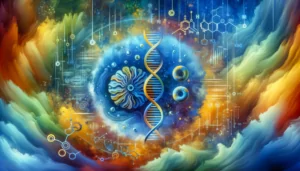Evolutionary Biology, an intriguing branch of science, is a field that studies the origins and diversification of life on our planet. Its theories and concepts are woven into the very fabric of biological understanding. This article aims to delve into this fascinating world of science, encapsulating everything from the theory of evolution and human evolution to the importance of fossils and genetics.

✅ AI Essay Writer ✅ AI Detector ✅ Plagchecker ✅ Paraphraser
✅ Summarizer ✅ Citation Generator
A Dive Into Evolutionary Biology
Evolutionary biology is the study of the evolutionary processes that have shaped the diversity of life on Earth. It involves the examination of all life forms, both extinct and extant, in order to trace their origins and changes over time. The breadth of this discipline allows it to intersect with other fields, including genetics, ecology, and paleontology. Furthermore, it draws on a variety of evidence sources, such as fossils and genetic markers, to build a comprehensive picture of life’s history.
Essential Concepts of Evolutionary Biology
One of the most vital concepts of evolutionary biology is the theory of evolution. This scientific theory describes how populations of organisms change over generations, driven by processes like:
- mutation
- gene flow
- genetic drift
- and, most famously, natural selection.
Natural selection, often attributed to Charles Darwin, is a process where individuals with traits that improve their survival or reproductive success are more likely to pass on these traits to the next generation.
Moreover, the concept of evolution by stages is another pillar in understanding evolutionary biology. It suggests that evolution doesn’t occur suddenly but rather gradually over long periods of time. For example, the origins of photosynthesis or the development of multicellular organisms did not happen overnight but were the result of incremental changes over millions of years.
Genetics: The Blueprint of Evolution
Genetics is a key player in evolutionary biology as it helps us understand how traits are passed from one generation to the next and how they can change over time. At the heart of genetics is the DNA molecule, which carries the genetic information that determines an organism’s characteristics. Mutations, or changes in DNA, are a primary source of the genetic variation that drives evolution. Understanding the role of genetics helps us better grasp how organisms adapt to their environments, leading to evolution.
Tracing the Path: Human Evolution
Human evolution serves as an excellent case study within the scope of evolutionary biology. It follows our species’ journey from our earliest hominid ancestors to the modern Homo sapiens. Evidence from genetics and fossil records has enabled scientists to piece together a rough timeline of our evolutionary history, depicting a bushy family tree with numerous branches and extinct species.
The Significance of Fossils
Fossils play an integral role in understanding evolutionary biology as they provide a tangible record of ancient life. They offer insights into:
- the morphology of extinct creatures
- their geographical distribution
- and the environments they lived in.
Radiocarbon dating is a technique often used to determine the age of these fossils, giving us a relative timeline of life’s evolution on Earth.
The Genesis of Life: Oxygen and Photosynthesis
The origins of oxygen and photosynthesis are pivotal points in the history of our planet, shaping the course of evolution. The emergence of photosynthetic organisms led to the production of oxygen, drastically changing Earth’s atmosphere and paving the way for the evolution of complex life.
Conclusion
In conclusion, evolutionary biology is a robust field that delves into the origins and development of life on Earth. Its broad scope allows it to intertwine with various scientific disciplines, each contributing a piece to the evolutionary puzzle. Through its lens, we can appreciate the intricate connections between life’s diversity and the biological, geological, and environmental history of our planet.
FAQ
What are the main concepts of evolutionary biology?
The main concepts of evolutionary biology include the theory of evolution, natural selection, evolution by stages, and the role of genetics in inheritance and variation. It also considers the evidence provided by fossils and explores significant evolutionary milestones like the origins of photosynthesis.
How does natural selection contribute to evolutionary biology?
Natural selection is a core principle of evolutionary biology. It posits that individuals with traits that improve their chances of survival and reproduction are more likely to pass these beneficial traits to their offspring. Over time, these traits become more common in the population, leading to evolution.
What is the role of genetics in evolutionary biology?
Genetics plays a crucial role in evolutionary biology as it determines how traits are passed from one generation to the next and how they change over time. DNA mutations are a primary source of genetic variation, fueling evolution by providing new traits for natural selection to act upon.
How does human evolution fit into the study of evolutionary biology?
Human evolution offers a specific instance of evolutionary processes. It involves tracing the lineage of Homo sapiens from our earliest hominid ancestors, utilizing evidence from both genetics and the fossil record. This study provides insight into how humans have adapted and evolved over millions of years.
What is the significance of fossils in understanding evolutionary biology?
Fossils offer a glimpse into the past, providing tangible evidence of extinct life forms. They reveal information about the morphology, behavior, and environment of these organisms. Consequently, they’re invaluable in charting the course of life’s evolution on Earth.
How do related fields like genetics and radiocarbon dating contribute to evolutionary biology?
Related fields provide tools and insights that enhance our understanding of evolutionary biology. Genetics helps us understand how traits change and are inherited, essential for studying evolution. Radiocarbon dating, on the other hand, helps us determine the age of fossils, allowing us to place evolutionary events in chronological context.
What is the importance of evolutionary biology in understanding life?
Evolutionary biology is vital as it explains the diversity and interconnectedness of life on Earth. It provides a framework to understand how species adapt to their environments and how these changes lead to the formation of new species over time. Moreover, it sheds light on our own species’ origins and development, informing our understanding of human health and disease.
Follow us on Reddit for more insights and updates.





Comments (0)
Welcome to A*Help comments!
We’re all about debate and discussion at A*Help.
We value the diverse opinions of users, so you may find points of view that you don’t agree with. And that’s cool. However, there are certain things we’re not OK with: attempts to manipulate our data in any way, for example, or the posting of discriminative, offensive, hateful, or disparaging material.